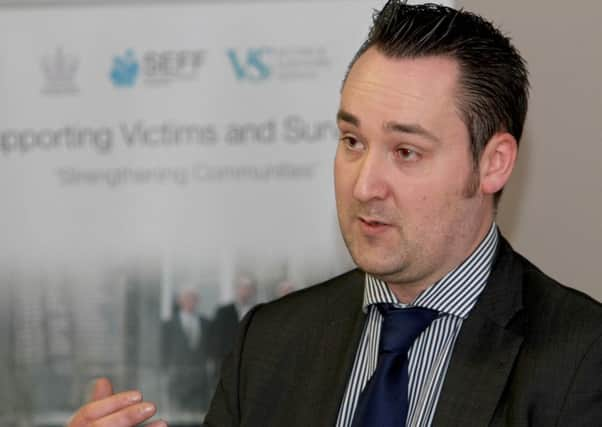Victims: The jury is still out on the DUP over legacy


In yesterday’s News Letter Sir Jeffrey Donaldson MP said the DUP would press for a UK-wide statutory definition of a victim to exclude terrorists; a statute of limitation against prosecutions of security force personnel who have already been investigated and that the party is reviewing the idea of an authoritative, evidence based account of the Troubles.
Kenny Donaldson, Director of Services with victims group South East Fermanagh Foundation (SEFF), said: “The jury is out on what the DUP are yesterday committing to, the proof is of course in the eating. The words are encouraging, they replicate what we have been calling for over a considerable period of time. Now action must finally follow.”
Advertisement
Hide AdAdvertisement
Hide AdHe welcomed what he described as “DUP backing” for SEFF’s previously published proposal on the definition of a victim and noted his group has consistently argued for “Commission for Historical Clarification” to combat “downright propaganda and lies”.
SEFF has also consistently opposed legislation, he said, which would equate security force members to terrorists, and backed a bar on prosecuting former police or soldiers who have already been properly investigated.
Campaigner Willie Frazer said he welcomed the DUP proposals “with caution”. He added: “We know the intentions of the DUP and Arlene Foster might be good, but after 20 years of campaigning for victims we find that actions always speak louder than words.”
He affirmed proposals to change the definition of victim and defend former security force members from “witch hunts”. But until the proposed changes go through Westminster - and the Irish government is equally held to account for “the failure to protect the Protestants on the border community... there can be no acceptance of these proposals”, he said.
Advertisement
Hide AdAdvertisement
Hide AdThe UUP has welcomed DUP proposal to amend the statutory definition of a victim - but said the party has missed the fact that the proposed Historical Investigations Unit “will focus on the actions of the state”.
UUP MLA Doug Beattie said he welcomed the fact that DUP proposals agree with his party’s view that there needs to be a more acceptable definition of a victim “that distinguishes between innocent victims and perpetrators”.
He added: “We do not however agree with the DUP on the desirability of a Statute of Limitations (SoL) because we believe that it would legally have to be extended to cover any group or individual and result in a general amnesty, which we are totally opposed to.”
If the DUP has an SoL plan which will avoid an amnesty for terrorists, the UUP would be keen to hear it, he added.
Advertisement
Hide AdAdvertisement
Hide Ad“Jeffrey’s comments fundamentally miss the point that the Historical Investigations Unit (HIU) will focus on the actions of the state and that those who have never had a proper investigation - or have had an HET report or who were injured - will continue to be ignored by the Northern Ireland Office”.
HIU resources should instead be diverted to the PSNI to investigate all cases except those previously investigated, he added.
TUV leader Jim Allister said: “There is more than a touch of hypocrisy here since the current proposals are based on the DUP/SF Stormont House Agreement which DUP endorsed without insisting on any change on the definition of a victim.
“If they’d done the right thing then this wouldn’t still be an issue.”
Advertisement
Hide AdAdvertisement
Hide AdUUP councillor Jeffrey Dudgeon said it is welcome that the DUP is revising its position on legacy. In particular, he noted the DUP’s ongoing consideration of an authoritative account of the Troubles - something he said the UUP previously proposed, but which was rejected during the Haass talks.
“I think the big question about the DUP proposals is what is actually deliverable by government,” he said. “It may be that no bill is passed if there is insufficient agreement to proceed.”
A special pension for innocent victims is “deliverable” and should be driven forward, he said. However, changing the definition of a victim and the statute of limitations could both be vetoed by Dublin and Sinn Fein, although the Torys may still proceed on the latter due to the repeated arrest of English veterans, he added.
But Grainne Teggart of Amnesty International was alarmed.
“Any moves to legislate for impunity through a statute of limitations should be rejected by government,” she said. “To grant a de facto blanket amnesty for human rights abuses would be in breach of the UK’s international obligations and would serve the interests of neither justice nor truth.”
Advertisement
Hide AdAdvertisement
Hide AdUlster University politics lecturer Dr Cillian McGrattan said the proposal of an authoritative account of the Troubles “represents an acknowledgement that the current proposals are heavily tilted towards promoting a state-centred, republican-based narrative of the conflict”. He added: “An evidence-based approach to the past may gain authority by limiting the number of lies that are told and passed on to future generations.”
Historian Dr Connal Parr from Northumbria University said it was “most encouraging to hear of the call for an increasing role for historians” whom he said are “best suited to address so much of the past conflict in Northern Ireland”.